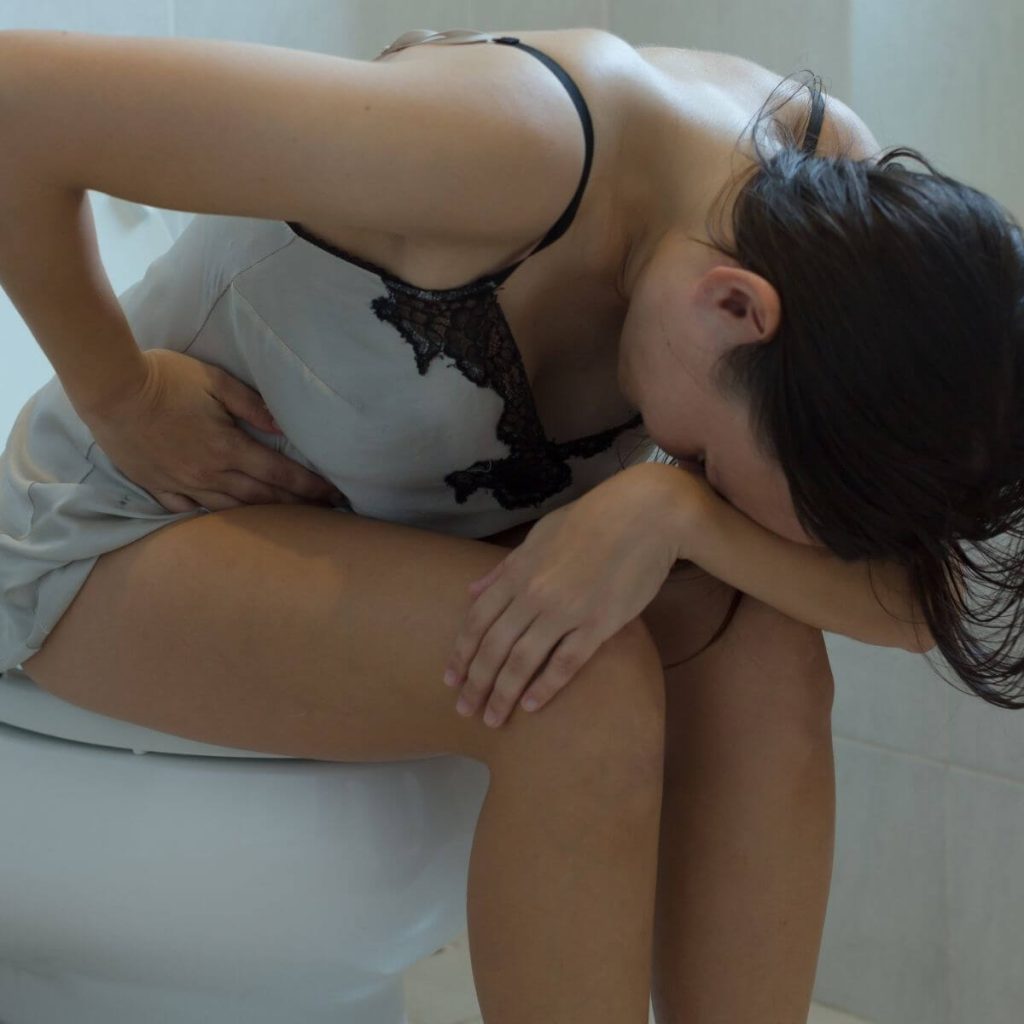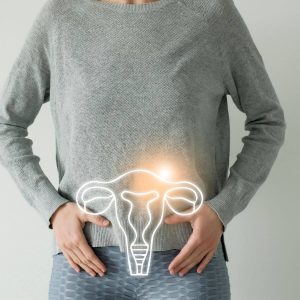While you were preparing for pregnancy and researching any unusual early pregnancy signs to look out for, I have a sneaking suspicion you didn’t think to research the side effects of implantation – like implantation cramps, for example.
That is, unless you have a slight case of health anxiety like me and research every strange twinge your body makes!
Implantation cramps aren’t necessarily at the forefront of many people’s minds during their “trying to conceive” (TTC) experience. Despite this, they’re a real thing experienced by more people than you might think.
The problem is, we often don’t even realize they’re happening.
Suppose you’d like to understand better what successful implantation symptoms can occur as your baby starts to take root within your uterine wall. In that case, it’s time to look at what implantation cramps are and how to identify them. We can help!

This site contains affiliate links, meaning that we earn a small commission for purchases made through our site. We only recommend products we personally use, love, or have thoroughly vetted.
- So, What Are Implantation Cramps?
- Does Cramping Start During the Two Week Wait?
- What Do Implantation Cramps Feel Like?
- Implantation Cramps vs. Period Cramps vs. Ovulation Cramps – Is There a Difference?
- When Should You Make an Appointment with Your Doctor?
- How to Help Implantation: Tips, Tricks, and Tidbits
- Implantation Cramping & Pregnancy Go Hand-in-Hand
So, What Are Implantation Cramps?
When it comes to early signs of pregnancy in the first two weeks, you might expect symptoms like nausea, fatigue, and breast tenderness.
You might not realize, however, that implantation cramps are often the first sign you’ve conceived during the two-week wait. But what are they? In the argument between implantation cramps vs. period cramps, are they essentially the same thing?
Definitely not!
Once an egg is fertilized, which takes place in your fallopian tubes, the developing embryo will make its way into your uterus. Upon arrival, it will embed itself into the endometrial lining along the wall of your uterus.
As your tiny blastocyst embryo (the most advanced stage of embryonic development) burrows its way into your uterine lining, it can cause mild implantation bleeding and cramping.
Does Cramping Start During the Two Week Wait?
On average, implantation happens around 5 – 6 days after fertilization. This is right in the middle of what’s known as the two-week wait.
In some situations, it can take up to 12 days after fertilization for the embryo to implant. This is why it’s not unusual to mistake implantation cramping for period cramping.

What Do Implantation Cramps Feel Like?
After both of my embryo transfers, I anxiously waited for any possible sign the process had worked. In each instance, I remember noticing a slight twinge inside my abdomen.
This was what implantation cramps felt like for me.
There were no severe or significant cramps, just a mild pulling sensation that seemed slightly out of the ordinary. Most non-obsessive people probably wouldn’t have even noticed it.
As with most things in life, no bodily experience will be exactly the same for everyone because we’re all unique. While I felt barely anything, you might experience intense cramping that’s hard to ignore. Or maybe you won’t feel anything at all.
There’s no black and white answer to the question, “What do implantation cramps feel like?”
While a detailed description would benefit anxious parents who want to know if they’re pregnant, the best advice we can offer is to pay close attention to your body and search for signs that something’s out of the ordinary.
How Long Do Implantation Cramps Last?
How long do implantation cramps last, you ask? You’ll be happy to hear this annoying cramping sensation usually only lasts for one to three days.
Implantation Cramps vs. Period Cramps vs. Ovulation Cramps – Is There a Difference?
Implantation cramps vs. period cramps vs. ovulation cramps – that’s a whole lot of cramping to try and cipher through and understand. What makes the task even more challenging, however, is that they’re all tied to one main event you’re hoping to conquer – getting pregnant.
Let’s break down the difference between these three common types of reproductive cramping:
- Implantation Cramping: Our primary focus for the moment, implantation cramping tends to be milder than the other two. As it involves your uterus, which is in the middle of your abdomen, the cramping tends to happen across your entire stomach instead of just implantation cramps on one side.
- Period Cramping: Period cramps usually start 1 – 3 days before our periods arrive. People often describe them as a throbbing or stabbing pain across our lower abdomens. The pain will radiate around to our lower backs and upper thighs for some of us, myself included.
- Ovulation Cramping: Approximately two weeks before your period arrives, ovulation will occur inside your body. While some women don’t experience any symptoms at all, others mention slight cramping that more closely resembles the “twinges” implantation cramping. While you won’t usually get implantation cramps on one side, one-sided ovulation cramps are more common, depending on which ovary is releasing an egg.
When Should You Make an Appointment with Your Doctor?
In most instances, implantation cramping is nothing to concern yourself with. Most of the time, it’s a good sign for hopeful parents longing to grow a family.
If, however, you find yourself worrying about how you feel and are asking questions like “Can implantation cramping last a week?” or “Is severe bleeding common with implantation?” it might be worth making an appointment with your doctor.
How to Help Implantation: Tips, Tricks, and Tidbits
When you’re dreaming of a baby and waiting “impatiently” for successful implantation symptoms to arrive, it’s not unusual to wonder if there are ways you can help implantation along.
While many old wives’ tales may or may not work, many parents credit specific implantation techniques with helping them conceive. Some of these include:
1. Pineapple for Implantation Success
While there’s a lot of conflicting information about whether this one actually works, I was a big believer in using pineapple for implantation.
Pineapple contains an enzyme known as bromelain that has both natural blood-thinning and anti-inflammatory properties. Some healthcare practitioners believe eating pineapple, specifically the core, can boost your chances of implantation success.
2. Taking Baby Aspirin for Implantation
Thanks to its anti-inflammatory properties, baby aspirin has become a common staple in treating infertility. A recent study of 1200+ women even deduced that women who took baby aspirin before conception had a 39% higher chance of conceiving.
3. Acupuncture for Fertility
Based on the American Pregnancy Association, there seems to be enough data available to prove acupuncture can play a positive role in helping people get pregnant. Not only can it improve ovarian and follicular function, but it also enhances the quality of the endometrial lining.
There’s one catch, though – if you’re going to use acupuncture for fertility, make sure to work with a licensed professional.
4. Keeping Your Uterus Warm
In Eastern medicine, it’s believed that keeping your uterus warm is an excellent option if you want to know how to help implantation. As Chinese practitioners think there’s a connection between the feet and the uterus, this process entails keeping your feet covered with cozy socks and shoes and consuming plenty of warm foods and drinks.
Some naysayers might not believe this is a reliable option, but here’s my take: if there’s a chance that wearing fuzzy socks and eating some soup will increase my chances of getting pregnant, I’m willing to try!

Implantation Cramping & Pregnancy Go Hand-in-Hand
So, try to stop worrying about how long implantation cramping will last or what implantation cramping should feel like. While irritating, implantation cramps don’t last long, and they can be a sign that implantation is in process.
If you experience heavy cramping or light cramps that last more than 1-3 days, or if you simply feel like something is “off” after the two-week wait, always consult with your doctor! That’s what they are there for.
Did you experience implantation cramping when you first got pregnant?










